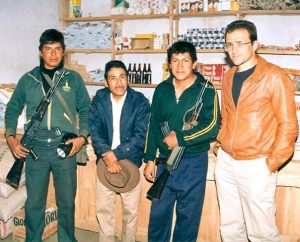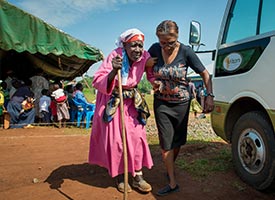By Paula Schlueter Ross
The Rev. Dan McMiller remembers how he felt as a new missionary at age 29, adjusting to life in Peru: “excited,” “very committed” and “idealistic,” but also “very cautious,” “overwhelmed” and “surrounded by peculiar things.”
There were odd foods, like baked guinea pig (yes, he ate it) and unfamiliar customs, such as men greeting women with a kiss on the right cheek (he did that, too).

But he wouldn’t trade those 14 years of overseas service — what he considered “a huge privilege” — for anything, he says, because the experiences taught him so much about life in a different culture as well as “the beauty of gathering with people around the Word and sacraments” and seeing “all of those [cultural] differences swept aside.”
Even though missionary service can be uncomfortable and downright difficult at times, it also can be “the most rewarding time of your life,” McMiller says.
And he encourages LCMS pastors, deaconesses, teachers, DCEs, DCOs, lay ministers and laypeople — including administrators and health workers — to consider whether or not God may be calling them to such service, particularly in Africa where the Synod is hoping to place at least 45 new missionaries by summer 2015.
That number isn’t a random choice, notes McMiller, director of recruitment for the LCMS Office of International Mission. It represents requests from African church bodies, some of which aren’t even in official fellowship relationships with the LCMS.
Africa, he explains, “is the place where the Lutheran church is growing the quickest,” and large church bodies in Ethiopia, Madagascar and Tanzania — as well as established LCMS partners in Kenya, Liberia, Nigeria and Togo — “are coming to the LCMS and asking for help primarily in the area of theological education and pastoral training.”
Whether or not these working relationships with non-partners eventually lead to official fellowship isn’t a major concern at this point, notes McMiller. What is important, he says, is “showing these church bodies that we’re willing to walk alongside them in ministry and in being Lutheran. … These requests for missionaries have come straight from them saying to us, ‘This is what we need.’ ”
The requests include some 20 pastors, who will be charged with helping their African counterparts — and other church workers — without advanced degrees to become more proficient in theology.
African Lutherans “desire good, Lutheran theological education,” notes the Rev. Dr. Edward Grimenstein, associate executive director of the LCMS Office of International Mission. And he encourages the Synod’s pastors to “fall back in love with their own theological education and be willing to share that with those in Africa who are desiring it.”
But, he adds, those pastor-missionaries won’t be going alone — they’ll be assisted by other professional church workers, health workers and laypeople. Some 25 missionaries in those categories also are needed.
Missionaries typically help raise their own funding, with assistance from the LCMS, and can be any age, from college graduate to retiree.
Several assessment tools are used by the OIM to determine if applicants are suited for overseas work. But characteristics that might be helpful are being flexible (to adjust to changing circumstances), entrepreneurial (to solve problems) and team-oriented (to work with others on the field).
Perhaps most importantly, “missionaries need to be able to articulate their faith well,” notes Grimenstein. “At the very core, that is what a missionary is being called to do. And that is one of the first things we look at in a candidate.”
Is missionary service safe?
“It’s not safe anywhere,” responds McMiller. “You can go to certain parts of St. Louis and not be safe.”
But the Synod does not send its missionaries into dangerous situations, he notes. And it closely monitors developments in other countries so that, if a crisis occurs, missionaries can be evacuated quickly.
“God sends His holy angels to watch over His called workers. I firmly believe that,” he added. It’s also comforting to know, he said, that missionaries’ support systems of congregations and others are praying for them, and “that connection is very healthy for the church.”
“We need missionaries,” added Grimenstein. “This is not an easy lifestyle, this is not an easy calling.” But many times, “those are the best.”
For more information about missionary opportunities, visit lcms.org/missionaries or contact McMiller at dan.mcmiller@lcms.org or 314-996-1341.
Posted Sept. 10, 2014 / Updated Sept. 17, 2014
